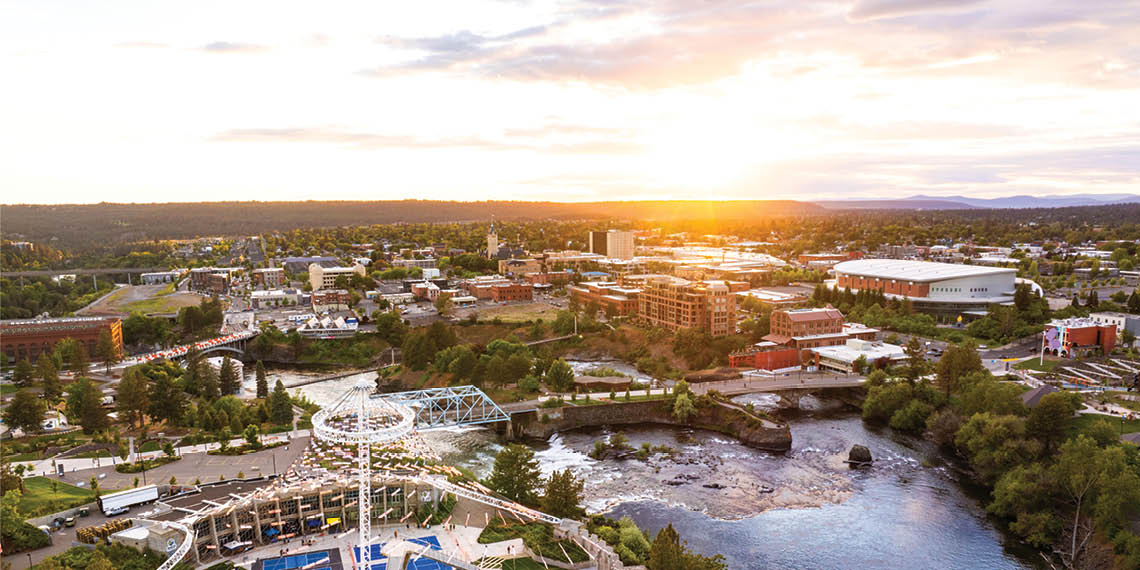Climate Institute Focuses on Local Change with Lasting Impact

This story is an adaptation of the Climate Institute's 2025 Annual Report.
The heat dome that descended on Spokane and the greater Pacific Northwest in summer 2021 was the sort of catastrophic weather event that will be remembered for generations.
Record-setting temperatures — reaching 109 degrees Fahrenheit — caused at least 19 deaths in Spokane County and 157 across Washington, making it the deadliest weatherrelated incident in state history.
Gonzaga’s Institute for Climate, Water, and the Environment, established the same year as the heat dome, has put mitigating the risks of extreme weather at the center of its work since its formation.
At its start, the Institute consisted only of Director Brian Henning and one undergraduate 51≥‘πœ. In the last year, 18 51≥‘πœs helped champion climate literacy and resilience, teaching more than 1,700 elementary and middle school 51≥‘πœs through the Climate Literacy Fellows program, and hosting more than 2,400 guests at various lectures.
Climate Resilience Project Manager Dante Jester says it can be easy to feel like you’re not doing enough, especially when the scope of the problem is so broad. “It's hard to remember that small impacts locally are significant impacts,” they say, emphasizing that right within your own community can be a great place to make real change.
In fact, that idea drives the Institute’s mission, “to engage in regional capacity building, scholarship and teaching to promote the flourishing of Inland Northwest communities, waters and lands in the face of a changing climate.”
So, how exactly does the Institute do that?
Karli Honebein, climate literacy project manager, is most proud of the implementation of the previously mentioned Climate Literacy Fellows. This program hires and trains Gonzaga 51≥‘πœs to deliver high-impact climate science lessons in elementary and middle school classrooms.
“Climate change is this huge global issue, but it's so much easier for everyone, especially kids, to think about climate change in their backyard,” Honebein says. “It also gives a hopeful lens to climate education, making sure 51≥‘πœs understand the problem so they can be agents of change.”
Additionally, the Institute has conducted extensive research in the form of air quality monitoring, extreme heat surveys and community insight reports, and helped form the Spokane Community Resilience Collaborative.
That collaborative, which includes the city of Spokane, Avista Utilities and the Spokane Regional Health District, released the first drafts of two community resilience plans for public review — one on extreme heat and one on wildfire smoke.
“Extreme heat and smoke are not just inconveniences, they are deadly,” said Spokane Mayor Lisa Brown. “These new resilience plans will save lives, protect our most vulnerable neighbors and make Spokane stronger in the face of a changing climate."
Four years after the heat dome, the Spokane area continues to set record high temperatures during the summers. In addition to extreme heat, wildfires are becoming more frequent and severe across the western United States and Canada, leading to worsening air quality even for those far from the actual fires.
“These resilience plans have been created by the Spokane community, for the community, with the belief that different organizations have different abilities, solutions to contribute and levels of responsibility,” Henning says. “To successfully protect our community from future climate-induced events, everyone has an important role to play. In working together, our community will increasingly be more resilient to our rapidly and dangerously changing climate.”
Facing new hardships
In December 2024, the Institute was awarded a three-year $19.9M grant to advance community resilience in Spokane, the largest grant in Gonzaga’s history. A few months later, the new federal administration targeted the grant for termination; the fate of the funding rests in the courts. Washington state’s sales tax-dependent budget has been impacted by national and international economic turmoil, leading the Legislature to shrink or eliminate several previously reliable state climate grant programs.
“We have in front of us a multigenerational task,” Henning says. “But despite the challenges, we are not deterred from our mission. We can and must continue to do as much as we can to address the climate crisis.”
The Climate Resilience Project
Created in response to the 2021 heat dome, this ongoing project works to increase research and community action in a collaborative way.
A look at some of this year’s accomplishments:
Heat Health and Safety Ordinance
Assisting Spokane City Council in creating this ordinance so landlords cannot prohibit tenants from installing air conditioning
Planning for Heat and Smoke
Drafting citywide Extreme Heat and Wildfire Smoke Resilience Plans to improve preparedness for climate-related hazards
Infrastructure Improvements
Nearly half a million dollars of improvements to NortheastCommunity Center’s HVAC system
Smoke Education
Creating a citywide wildfire smoke education campaign in collaboration with Spokane Regional Clean Air Agency
- Service & Community Impact
- Institute for Climate, Water, and the Environment
- Gonzaga Magazine




